The start of 2021 brought with it the end of the “tampon tax”. After years of campaigning, the government finally accepted the argument that sanitary products are an essential product, not a luxury, and should be treated as such for VAT purposes. Now, as with most food and children’s clothing, they attract a zero rate of tax.
The tampon tax campaign was the loudest relating to VAT rates in recent memory but it’s certainly not the only one.
One that has been gathering steam of late relates to VAT on Covid tests for travellers. This week there were demands for ministers to cap the cost of PCR tests for international travel, and there is growing anger in some quarters about the way the government is earning millions of pounds from the regime because the tests carry VAT at 20%.
This week the Liberal Democrats called on the government to “scrap the VAT on tests” that was helping to keep prices high.
There are other campaigns running involving everything from bottles of sunscreen to solar panels.
So should we be getting on board with other calls to scrap the tax? We have rounded them up here so you can make up your own mind.
But first, a few basics. The standard rate of VAT (value added tax) is 20%, which applies to most goods and services. It is a tax paid by consumers but collected by businesses. VAT is a vital part of how the British government raises revenues, and any more changes would mean a decrease in government spending, an increase in borrowing or a rise in other taxes. In the 2019-20 tax year, VAT raised £133.8bn, equivalent to about £4,700 for each household.
Period pants
The removal of VAT on sanitary towels and tampons was a victory for campaigners. But the legislation did not extend to period pants, which still carry 20% VAT. Period pants are reusable underwear meant to serve the same purpose as disposable sanitary products.
As the government stated in January, sanitary wear is not a luxury but essentialModibodi’s Kristy Chong
Modibodi, which sells period pants, is campaigning on the issue with the backing of the Women’s Environmental Network (Wen).
Kristy Chong, the chief executive and founder of Modibodi, told Guardian Money: “As the government stated in January, sanitary wear is not a luxury but essential, so we’re frustrated that the government continues to exclude sustainable period pants from its revised tampon tax definition.
“In order to progress its environmental goals and reduce period poverty in the UK, the government should be providing a level playing field for sustainable period pants and incentivise choosing sustainable products rather than creating financial barriers.”
Period pants vary in cost but £15-£20 is a fairly average price, so VAT makes a noticeable impact.
Period pants petition
Covid tests for travellers
Currently many people travelling to and from the UK to other countries are required to take a paid-for PCR test before or after their journey, or both.
Prices for these tests vary hugely but the consumer body Which? this month estimated that for a return trip to some popular holiday destinations, an unvaccinated traveller could end up paying more than £200 a person for tests. These tests carry 20% VAT, meaning some families could face paying perhaps £100 to £200 in extra taxes to go on holiday.
However, a Guardian investigation this week found that some test providers were not, in fact, charging VAT.
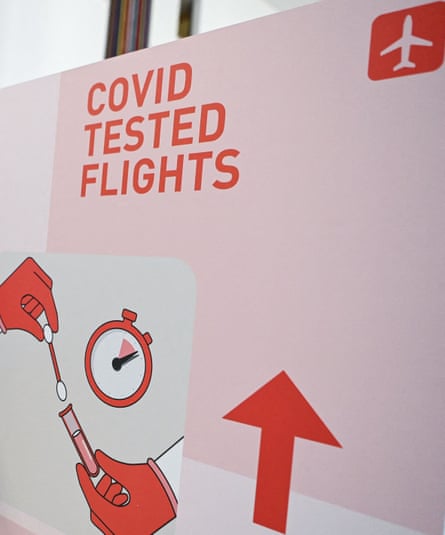 View image in fullscreenPrices for PCR tests vary hugely for travellers. Photograph: Piero Cruciatti/AFP/Getty Images
View image in fullscreenPrices for PCR tests vary hugely for travellers. Photograph: Piero Cruciatti/AFP/Getty Images
While going on holiday is not essential, there is an argument that the government should be doing what it can to encourage testing and support the struggling travel and tourism industry.
The MP Layla Moran, the chair of the all-party parliamentary group on coronavirus, told Guardian Money: “Most other European countries have succeeded in reducing the cost of PCR tests for consumers through capping prices or VAT exemptions. The government should consider similar measures to reduce the costs of PCR tests in the UK, which remain crucial to our efforts to track new variants and keep Covid cases under control.”
The travel firm Tui is offering cheap tests for its customers but says: “We’re urging the government to help the industry and travellers by introducing cheaper tests for all those looking to get away this summer.”
Responding to a written question from MP Sarah Olney, Jesse Norman, the financial secretary to the Treasury, said: “Medical testing administered by registered health professionals is exempt from VAT. The government also continues to offer free Covid-19 testing for those with Covid-19 symptoms, and everyone in England, including those without symptoms, are able to take a free rapid coronavirus test twice a week.”
PCR test petition
Sunscreen
The NHS website’s advice on sun exposure is to spend time in the shade, cover up with suitable clothing and use at least factor 30 sunscreen. And, yes, you can burn in the UK, even when it’s cloudy.
Despite advice that we should all be using it, there is 20% VAT on sunscreen. This issue has caught the attention of MPs – in 2019, Labour’s Chris Bryant called for changes.
Bryant told Guardian Money: “Having had a stage IIIB melanoma removed from the back of my head and undergone a year of targeted treatment, I know how frightening skin cancer can be. Sun damage is the main cause of skin cancer, so everything we can do to make good-quality sunscreen affordable to everyone will help save lives.”
On 21 July this year, the Scottish National party MP Patricia Gibson issued a parliamentary petition urging the government to remove VAT on sunscreen.
Outside Westminster, Tesco is among those making a stand on the issue, and earlier this year said it was permanently reducing the price of its Soleil sun protection range by 20% “to cover the cost of VAT”, as it believed “the safety of the nation’s skin should not be treated as a luxury”.
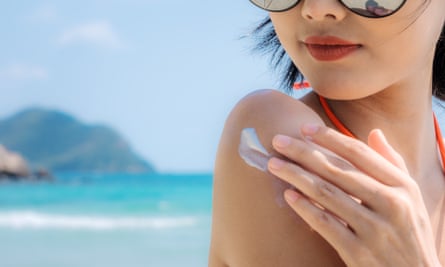 View image in fullscreenThere is 20% VAT on sunscreen. Photograph: Virojt Changyencham/Getty Images
View image in fullscreenThere is 20% VAT on sunscreen. Photograph: Virojt Changyencham/Getty Images
The market for suncare products was worth £279m in 2019, and although this includes after-sun and other related products, it means the sector brings the government tens of millions of pounds in VAT a year. That would be a large amount for the Treasury to have to make up every year.
But there could be savings made to the NHS if sunscreen use increases. One estimate has put the cost of skin cancer to the NHS at more than £180m a year.
In September 2020, in an answer to a question from the MP Rehman Chishti, the Treasury said that high-factor sunscreen was on the NHS prescription list for certain conditions and was provided VAT-free when dispensed by a pharmacist, adding: “Expanding the scope of the current VAT relief would come at a considerable cost to the exchequer.”
Sunscreen petition
Personal safety alarms
Safety organisations including the Suzy Lamplugh Trust suggest people should consider carrying a personal alarm if they feel anxious while out and about. The cost of these alarms varies widely – easily available models range from £3 to upwards of £20 – and they include 20% VAT.
Caroline Nokes, the chair of the Commons women and equalities select committee, has called on the government to remove the tax. She says: “From my perspective this is a very small step the Treasury could take to encourage the purchase of a device which might just deter an attacker. It is really clear to me that we need to have a concerted effort to reduce male violence perpetrated against women. The VAWG [Violence Against Women and Girls] strategy published recently has some excellent measures in it but we need HM Treasury to get behind it, and an easy way to do that could be a VAT reduction on these items.”
One online petition refers to VAT on alarms as a “fear tax”, and says: “We should not be charged for the choice to feel safe.”
Personal safety alarms petition
Solar panels and other green home improvements
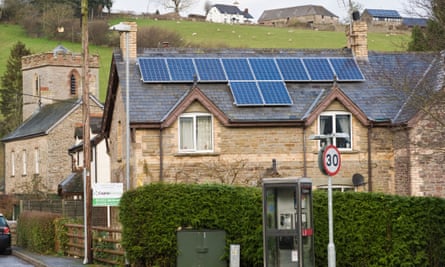 View image in fullscreenSolar panels fitted to the roof of a rural property. Photograph: Jeff Morgan 10/Alamy
View image in fullscreenSolar panels fitted to the roof of a rural property. Photograph: Jeff Morgan 10/Alamy
The UK government has a 2050 net zero carbon target and last year announced a £3bn plan to “upgrade the nation’s buildings” to make them greener and cheaper to run. But at the same time, ministers have been resisting calls to reduce VAT on green home improvements.
Libby Peake, the head of resource policy at the thinktank Green Alliance, says that VAT, as it stands, isn’t driving the sorts of purchases that would lead to a low-carbon, nature-rich world. “In fact, in far too many instances it’s encouraging the opposite – damaging products and activities.”
She points out that while there is 20% VAT on many solar panel installations, there is only 5% VAT on home gas supplies.
“And while you pay the full VAT rate to retrofit your home – to keep it in good repair and improve its energy efficiency – new-build benefits from no VAT whatsoever while using a lot of resources and emitting a lot of carbon,” she says.
“Simple adjustments to VAT to end these perversities would send a strong signal to the public that the economy is geared towards creating a greener, healthier society.”
Low and zero carbon products petition
Children’s car seats
It is the law for children to use a car seat when they travel, yet parents and carers pay 5% VAT when they buy them. This is a reduced rate, from the standard 20%, but not as low as the 0% rate on other products, including cycle helmets, which are not mandatory by law but are exempt from VAT if they meet regulations for personal protective equipment.
We urge the government to scrap the current 5% VAT imposed on child safety seatsThe Childhood Trust’s Laurence Guinness
Halfords, which sells children’s car seats, has previously campaigned on the issue. A Halfords spokesperson says: “Children’s car seats are a necessity for millions of families in the UK. Parents and grandparents should not be charged extra for protecting children, which is why we would like to see VAT on car seats either reduced or ended.”
Laurence Guinness, the chief executive of poverty charity the Childhood Trust, told Guardian Money: “We urge the government to scrap the current 5% VAT imposed on child safety seats. This is a damaging tax on safety that disproportionately impacts families on the lowest incomes with multiple children and may well be contributing towards harm to children by those who, through no fault of their own, just can’t afford the best protection for their young children.”
In September 2020, in a response to a question from the MP Bridget Phillipson, the Treasury said: “Families already benefit from a reduced rate of VAT of 5% on children’s carrycots with restraint straps. The government has no plans to change this VAT treatment at this time.”
Vapes
Probably the most arguable product being campaigned on is vapes, which attract 20% VAT. They are a product that is not an essential and, we are advised, is bad for our health, although for smokers they could be a good way to quit.
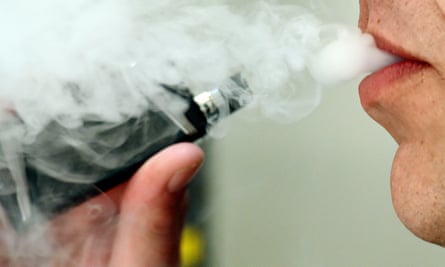 View image in fullscreenVaping is seen by some in the health profession as a way to quit smoking, fuelling calls to cut VAT on vaping products. Photograph: Nick Ansell/PA
View image in fullscreenVaping is seen by some in the health profession as a way to quit smoking, fuelling calls to cut VAT on vaping products. Photograph: Nick Ansell/PA
In February this year, Prof John Newton, the director of health improvement at Public Health England, said smoking was still the leading preventable cause of premature death and disease, killing almost 75,000 people in England in 2019, “and the evidence shows that vaping is one of the most effective quit aids available, helping around 50,000 smokers quit a year”.
John Dunne, the director general of the UK Vaping Industry Association, believes a lower rate of VAT on vapes could help more people give up smoking. He says: “We’re not looking to remove the VAT on vaping products – we’re looking to be in line with other nicotine replacement therapies such as gum and patches, which are VAT-rated at 5%.”
The previous VAT rows: pasties, Jaffa Cakes and caravans
Issues around VAT can get pretty heated, as anyone who remembers the “pasty tax” affair of 2012 will attest. That involved proposals to impose VAT on hot takeaway food such as Cornish pasties.
The stated reason for the introduction of 20% VAT was to end “anomalies”, yet within days it had triggered an almighty row. The high street bakery chain Greggs and the National Association of Master Bakers (now called the Craft Bakers Association) brought pasty makers to Downing Street in force to deliver a petition from half a million people opposing the plans.
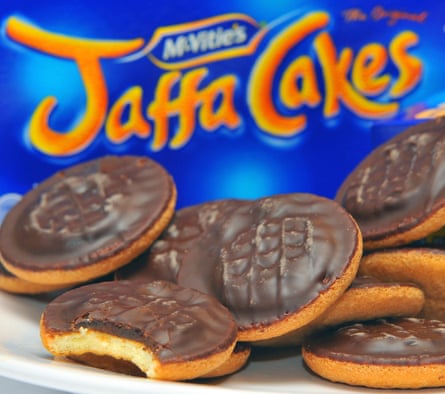 View image in fullscreenThe Jaffa Cake has long been the subject of a debate over whether it is a cake or a biscuit. Photograph: Clive Gee/PA
View image in fullscreenThe Jaffa Cake has long been the subject of a debate over whether it is a cake or a biscuit. Photograph: Clive Gee/PA
The outcry eventually prompted a government U-turn, with the then chancellor, George Osborne, saying he would not charge VAT on food that was designed to cool down, such as sausage rolls and pasties.
In that same year there was also a government climbdown over the introduction of a 20% VAT charge on static caravans used for holiday purposes. With opponents lining up to criticise the move, the government eventually cut the tax charge on static caravan sales to 5%.
Spool back 30 years and there was a big bust-up over Jaffa Cakes and VAT. In 1991, McVitie’s went to court to defend the Jaffa Cake’s non-biscuit status. The company successfully argued that the product was a cake, not a biscuit, and so was not liable for VAT.
Cakes are considered to be a staple food and therefore zero-rated for VAT. Biscuits are also zero-rated unless they are “wholly or partly covered in chocolate (or some product similar in taste and appearance)”, to quote the official rules.
A tribunal determined that certain characteristics of the Jaffa Cake were cake-like, including the ingredients and texture, but it was also the size and shape of a biscuit, packaged and sold alongside biscuits, and presented to be eaten with the fingers and not, as might be expected of a cake, eaten with a fork. The product was nevertheless determined to be a cake.
However, that has not stopped the “is it a cake or is it a biscuit” debate from continuing to rage online every now and again.
This article was amended on 15 August 2021 to correctly attribute a quote to Layla Moran MP, rather than to Sarah Olney MP as an earlier version had it.



